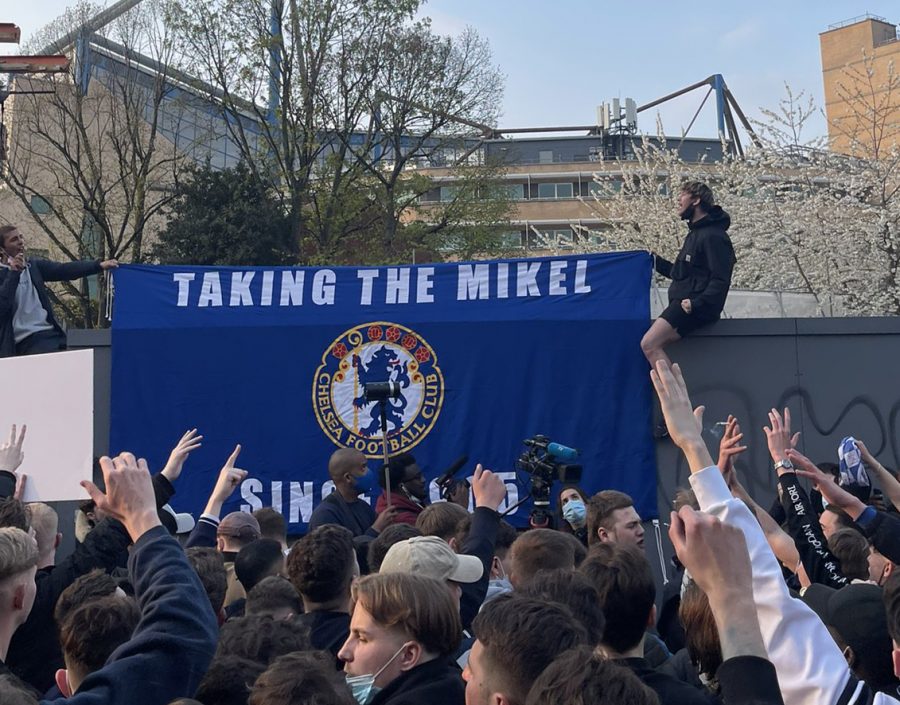Opinion | Proposed Super League will ruin soccer forever
Photo Courtesy of DaintonAlex’s Twitter
A crowd of soccer fans in Europe protest the Super League. Columnist Nick Johnson argues that the Super League was created in the interest of greed instead of the spirit of soccer.
Apr 22, 2021
European club soccer is the mainstay of global sports. While the United States may dominate the athletics scene by terms of diversity in the shape of different types of professional sports, the attention received by each American league pales in comparison to the worldwide infatuation fans possess for what is known as the Top Flight leagues of Europe.
Consisting of five leagues — the Premier League of England, the Bundesliga of Germany, La Liga in Spain, Serie A in Italy and Ligue 1 in France — the Top Flight leagues are home to the world’s most iconic sports teams and fervently passionate fanbases. The thrill of European club soccer lasts year-round for the hundreds of millions of fans it boasts, whether it be watching a domestic league season or the Union of European Football Associations Champions League.
However, all the enjoyment that comes with being a fan of European soccer is about to be decimated.
Florentino Pérez, president of Real Madrid Club de Fútbol, announced that his club will be joining 11 others in forming a new European Super League that will change the outlook of European club soccer forever. The 12 teams — which are among the world’s richest and are members of four Top Flight leagues — are to face off against each other in weekly matches and compete for a title amongst themselves.
This new format would completely uproot the existing structure of European soccer, which sees teams of the same country play one another throughout the year for their respective domestic league titles and only play opponents of different countries a seldom few times a year in massively popular tournaments.
Now the European Super League threatens to monopolize meaningful club competition for only the world’s richest teams. For fans, the greatest draw to watch international club tournaments like the UEFA Champions League is that anything can happen — just once a year, each team that performed well enough in their domestic leagues to qualify for the tournament are given a chance to battle and determine the supreme club team in all of Europe.
Arguably the most memorable moments of the Champions League were born out of an underdog team overcoming all odds and defeating a European club titan, with the 1995 championship match being a prime example.
In this particular tournament, Dutch team AFC Ajax — which resides outside of the Top Flight leagues — defeated Italian giant AC Milan, a team that was returning to the Champions League final for the third year in a row. The 1995 Ajax squad possessed an average roster age of twenty-three years, while AC Milan boasted what many consider to be one of the best starting XI to ever appear on a pitch.
Should the formation of the European Super League proceed as planned, moments like these will never occur again. To put the debacle in terms of American sports: Imagine if the NCAA declared they would be doing away with the March Madness tournament and instead created an extra league where only twelve blue blood teams — like Kentucky, Duke, North Carolina, etc. — would be eligible to be crowned as champions of college basketball.
If the glory of international club competition isn’t already doomed in spirit, it also is by literal terms. President of UEFA, Aleksander Čeferin announced that all participating Super League clubs and their players will be banned from competing in UEFA competitions, including the Champions League, Euros and World Cup.
This would mean legends such as Lionel Messi wouldn’t be able to compete for a meaningful trophy ever again. The proclaimed golden age of American soccer that has been years in the making will be halted for at least a generation, as the most talented stars the U.S. Men’s National Team have invested their future in currently playing for one of these twelve clubs.
Future Super League teams currently competing in the semifinal round of the Champions League would be immediately ejected from the tournament and replaced with teams that have already been eliminated. If this weren’t humiliating enough, these teams would never be presented with the opportunity to win a Champions League ever again.
The implications of the Super League are devastating — the integrity of the competitions that have been used to judge greatness throughout history will be in ruins. The World Cup and Euro Tournament will be devoid of the world’s best players, the Champions League a shell of its former self and the dreams of each fan to watch their favorite club be crowned king of Europe irreparably shattered.
European soccer will no longer be defined by millions of passionate fans supporting their teams on the road to eternal glory, but rather by the greed, arrogance and selfishness of the world’s wealthiest club owners looking to further line their already corpulent pockets. One can only hope the founding clubs will succumb to Čeferin’s pressure, or else the world’s game will forever become the game of the rich.
Nick is a sophomore in LAS.
[email protected]






